专四语法(状语从句+反意疑问句)
- 格式:ppt
- 大小:178.00 KB
- 文档页数:21
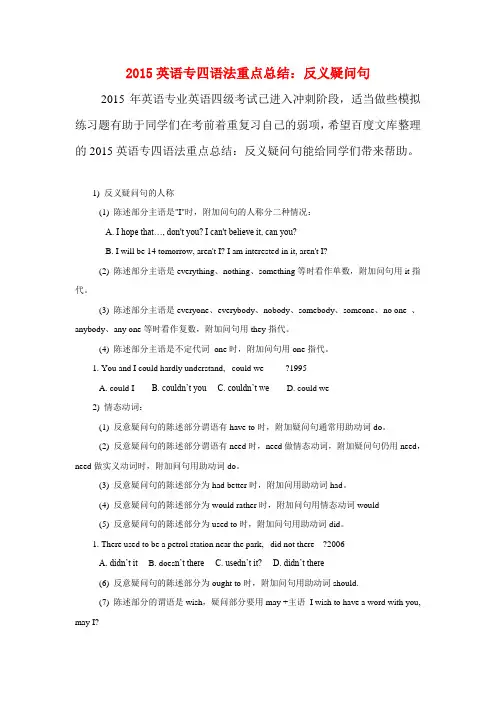
2015英语专四语法重点总结:反义疑问句2015年英语专业英语四级考试已进入冲刺阶段,适当做些模拟练习题有助于同学们在考前着重复习自己的弱项,希望百度文库整理的2015英语专四语法重点总结:反义疑问句能给同学们带来帮助。
1) 反义疑问句的人称(1) 陈述部分主语是"I"时,附加问句的人称分二种情况:A. I hope that…, don't you? I can't believe it, can you?B. I will be 14 tomorrow, aren't I? I am interested in it, aren't I?(2) 陈述部分主语是everything、nothing、something等时看作单数,附加问句用it指代。
(3) 陈述部分主语是everyone、everybody、nobody、somebody、someone、no one 、anybody、any one等时看作复数,附加问句用they指代。
(4) 陈述部分主语是不定代词one时,附加问句用one指代。
1. You and I could hardly understand, _could we_____?1995A. could IB. couldn’t youC. couldn’t weD. could we2) 情态动词:(1) 反意疑问句的陈述部分谓语有have to时,附加疑问句通常用助动词do。
(2) 反意疑问句的陈述部分谓语有need时,need做情态动词,附加疑问句仍用need,need做实义动词时,附加问句用助动词do。
(3) 反意疑问句的陈述部分为had better时,附加问用助动词had。
(4) 反意疑问句的陈述部分为would rather时,附加问句用情态动词would(5) 反意疑问句的陈述部分为used to时,附加问句用助动词did。
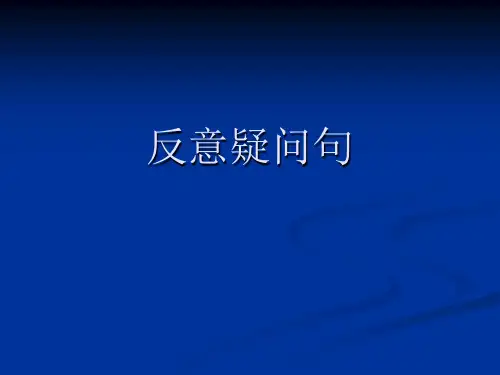
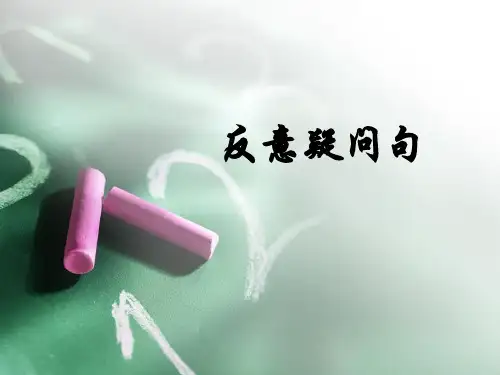
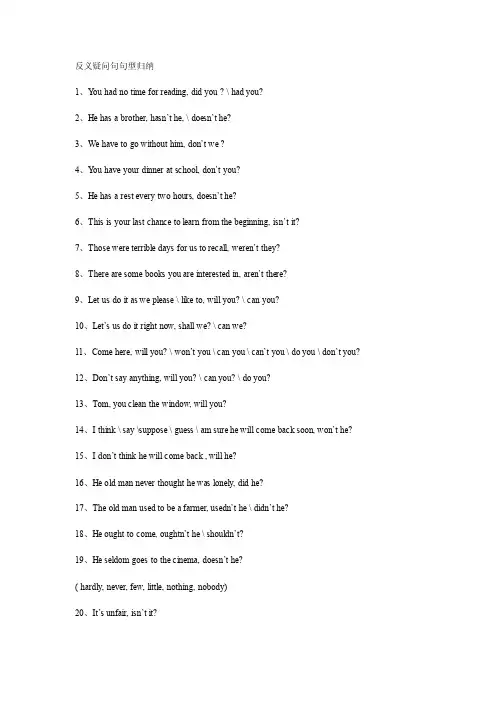
反义疑问句句型归纳1、Y ou had no time for reading, did you ? \ had you?2、He has a brother, hasn’t he, \ doesn’t he?3、We have to go without him, don’t we ?4、Y ou have your dinner at school, don’t you?5、He has a rest every two hours, doesn’t he?6、This is yo ur last chance to learn from the beginning, isn’t it?7、Those were terrible days for us to recall, weren’t they?8、There are some books you are interested in, aren’t there?9、Let us do it as we please \ like to, will you? \ can you?10、Let’s us do it r ight now, shall we? \ can we?11、Come here, will you? \ won’t you \ can you \ can’t you \ do you \ don’t you?12、Don’t say anything, will you? \ can you? \ do you?13、Tom, you clean the window, will you?14、I think \ say \suppose \ guess \ am sure he w ill come back soon, won’t he?15、I don’t think he will come back , will he?16、He old man never thought he was lonely, did he?17、The old man used to be a farmer, usedn’t he \ didn’t he?18、He ought to come, oughtn’t he \ shouldn’t?19、He seldom goes to the cinema, doesn’t he?( hardly, never, few, little, nothing, nobody)20、It’s unfair, isn’t it?21、One can’t be careful enough, can one \ can he?22、Everything goes well, doesn’t it?23、Everybody agrees with him, doesn’t he \ don’t they?24、All w e needed has been bought, hasn’t it?25、All we invited have arrived, haven’t they?(All refers to people)26、Learning English is very hard, isn’t it?27、He studies hard and he is often praised by his teachers, isn’t he?28、We must be more polite in this occasion, needn’t we?29、He must be a brave man, isn’t he?30、It must have rained last night, didn’t it?31、He mush have known the answer, hasn’t he?32、He can’t have done such a foolish thing, has he?33、I am a student, aren’t I ?34、So he has known the secret, has he?35、Oh, you have the same type of sell phone as I, do you?反义疑问句注意一、反义疑问句是疑问句的一种,它对陈述部分的事实提出相反的疑问,形式上是一个省略问句,附加在陈述句后,即:陈述句+ 逗号+ 省略问句+ 问号Y ou are from America, aren’t you?注意二、遵循前否定后肯定或前肯定后否定的原则(但在祈使句等一些特殊句子中需注意,详细见注意七)Jim isn’t in Class Four, is he?注意三、附加疑问句必须前后两句主语相同Mr Zhang has been here for four years, hasn’t he?注意四、附加疑问句部分与主语不一致的若干情况如下(需牢记)1.this 或that改it,无论是否指人This is your brother, isn’t it?2. these或those改theyThose are books ,aren’t they?3. 不定代词one改one或heOne can’t be always young, can one / he?4. something、anything、everything和nothing改itNothing is serious, is it? (注意为什么后面用is it而不是isn’t it?)Everything seems all right, doesn’t it?5. everybody、everyone、somebody、someone、anybody、anyone、nobody改they或he(任选,但选定后注意单复数形式)Everyone knows this, don’t they / doesn’t he?Nobody likes to lose money, does he? (这里最好用he)6.each of改he或theyEach of the boys had an apple, didn’t he / they?7. no one, none, neither, either改they 或heNo one came, did they?8. some of…、none of …改it、they或you(联系上下文或句子)None of the food was delicious, was it?Some of the dustmen have come back, haven’t they?9. 由neither…nor…、not only…but also、both…and…、either…or…、not…but…、…or…、…and…等连接的并列主语,改复数代词Neither you nor I am wrong, are we?Both Tom and Jack came, didn’t they?10. 由动词不定式、动名词、从句或词组构成的主语,改itTo learn English well isn’t easy, is it?Swimming is great fun, isn’t it?11. the + 形容词表示一类人,改复数代词The poor had no right (权力) to speak at the time, did they?12. there 引起的句子(There be句型等),仍用thereThere stands a house and a lot of trees, doesn’t there?There are many children in the park, aren’t there?注意五、附加疑问句部分与谓语不一致的若干情况如下(需牢记)(初中阶段14点18点和19点可以常识性了解)1. have (有)改have或doMary has two brothers, doesn’t she / hasn’t she?2. have (有)必须与陈述部分一致He hasn’t a lot of time, has he?Miss Green doesn’t have any money in her pocket, does she?3. have不做“有”解释,必须用doThey all have a good time, don’t they?4. have to用do或haveWe have to g et up early, don’t we / haven’t we?5. have got to用haveWe have got to answer all the questions, haven’t we?6. had better用should或hadWe had better go right now, shouldn’t we / hadn’t we?7. can’t(不可能,表示推测)根据can’t或的动词选择相应的形式He can’t be a doctor, is he?The workers can’t have finished their work, have they?8. may 用may + 主语+ not (英语中不用mayn’t)They may be here next week, may they not?9. must(必须)用needn’tY ou must do it today, needn’t you?10. must(应该)用mustn’tI must study hard, mustn’t I?11. mustn’t用must或mayY ou mustn’t talk like that, must you?We mustn’t stay here any longer, must we?12. “must be”对现在情况进行推测作一般现在时或现在进行时的附加疑问句进行处理2 反义疑问句He must be happy, isn’t he?He must be working hard at the office, isn’t he?must表示推测时,也有用mustn’t的He must have been working very hard, mustn’t he?Y ou must have told Mr Wang the secret, mustn’t you?13. “must + 完成时”表示对过去情况的推测,作一般过去时附加疑问句处理He must have come yesterday, didn’t he?Y ou must have seen the play last week, didn’t you?14. “must + 完成时”用来推测过去的动作持续到现在按现在完成时的附加疑问句来处理Y ou must have studied English for years, haven’t you?He must have lived here for at least ten years, hasn’t he?14. 实义动词need和dear用doHe needs help, doesn’t he?I have never dared to ask him, have I?15. 情态动词need和dear用need和dearHe dare not say so, dare he?We need not do it again, need we?16. needn’t 用need或mustY ou needn’t go yet, need you?He needn’t do that, must he?17. “ would rather + 动词原形”和“would like to + 动词原形”用wouldn’tHe would rather read the t ext ten times than recite it, wouldn’t he?Y ou’d like to have some bananas, wouldn’t you?18. “ought to + 动词原形”用oughtn’t 或shouldn’tThe child ought to be punished, oughtn’t he?We ought to go there, shouldn’t we?19. “used to + 动词原形” 用“didn’t + 主语”或“usedn’t + 主语”或“used + 主语+ not”He used to live in London, usedn’t he / didn’t he?He used to play football when he was a child , used he not?注意六、句子中有seldom, hardly, no, not, never, few, little, nothing, nobody, nowhere等是否定句,附加疑问部分必须采用肯定形式Nobody phoned while I was out, did they?He is hardly able to swim, is he?There is little ink in your pen, is there?no one, nobody, none, nothing, neither等作动词的宾语时,附加疑问部分一般采用肯定形式(也偶尔用否定形式)He has nothing to say, does(n’t) he?Y ou got nothing fr om him, did(n’t) you?注意七、一些特殊句型的附加疑问句1. I am…改aren’t II am your friend, aren’t I?2. I wish to do sth或I wish I …改may II wish to go home, may I?I wish I were you, may I?3. 主从复合句,与主句的主谓语保持一致He says that I did it, doesn’t he?Da vid wouldn’t go there if it rained, would he?4. 并列句,与邻近的分句保持一致Mary is a nice girl, but she had one short-coming, hadn’t she?5. 表示邀请,请求的祈使句,附加疑问部分用will you或won’t you或would you等,一般只要记住will you就可以了,不遵循前否定后肯定或前肯定后否定的原则Come here, will you?Turn off the light, will you?Do sit down, will you?6. 表示告诉别人做某事的祈使句,用will you、can you、would you或can’t you、won’t you Stop talking, can you?Write down the new words, will you / won’t you?7. 否定的祈使句用will you或can youDon’t make a noise, will / can you?8. Let me …用will you 或may ILet me help you, may I?Let me do it, will you?9. Let’s …表示建议包括听话人在内,用shall weLet’s go for a walk, shall we?10. let us …表示允许,不包括听话人在内,用will youLet us do it by ourselves, will you?11. Let接第三人称宾语时用will youLet him come in, will you?12. Let’s not … 用OK或all rightLet’s not go to the party, OK / all right?13. 感叹句用一般现在时be的形式(故事中用一般过去时be的形式)What fine weather, isn’t it?How clever the boy is, isn’t he?How hard she works, isn’t she?。
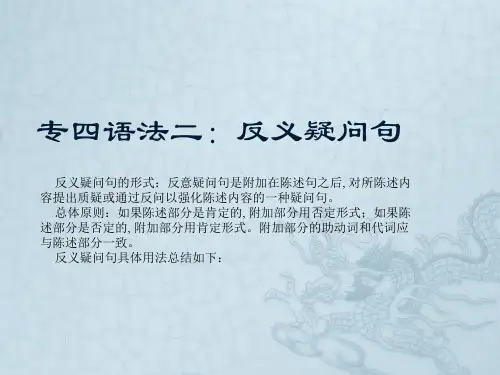
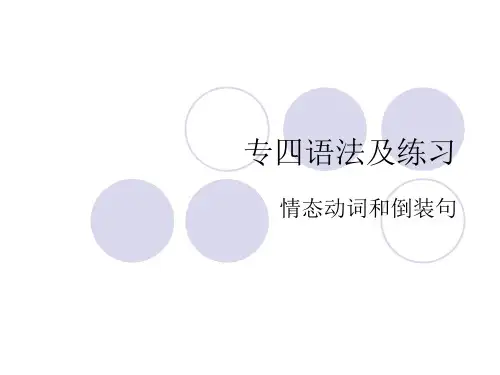
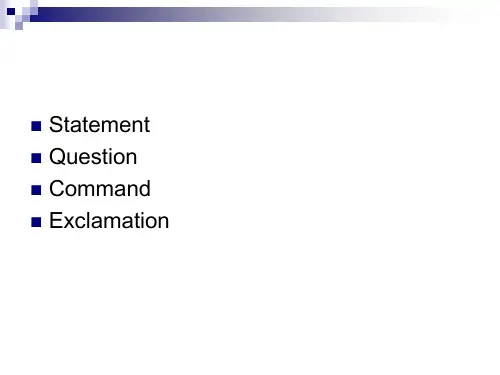
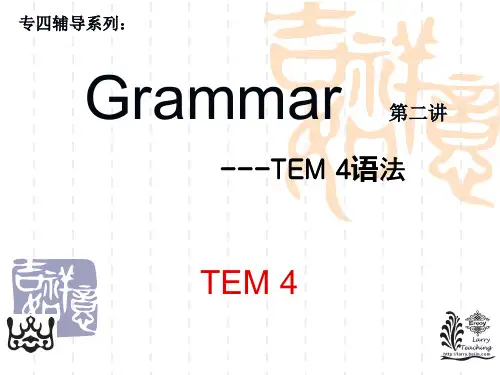
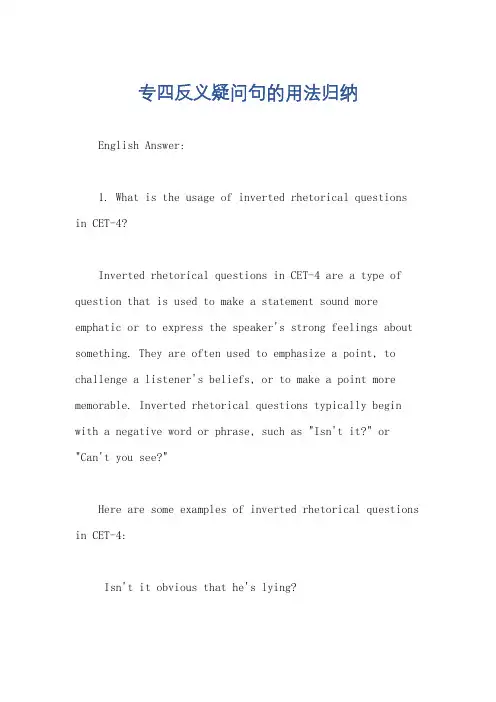
专四反义疑问句的用法归纳English Answer:1. What is the usage of inverted rhetorical questions in CET-4?Inverted rhetorical questions in CET-4 are a type of question that is used to make a statement sound more emphatic or to express the speaker's strong feelings about something. They are often used to emphasize a point, to challenge a listener's beliefs, or to make a point more memorable. Inverted rhetorical questions typically begin with a negative word or phrase, such as "Isn't it?" or "Can't you see?"Here are some examples of inverted rhetorical questions in CET-4:Isn't it obvious that he's lying?Can't you see that this is wrong?Don't you think that this is important?Inverted rhetorical questions can be a powerful toolfor expressing your thoughts and feelings. They can help you to make a point more effectively and to leave a lasting impression on your listener.2. What are some of the benefits of using inverted rhetorical questions in CET-4?There are several benefits to using inverted rhetorical questions in CET-4. These benefits include:They can make your point sound more emphatic. Inverted rhetorical questions can help you to emphasize a point and to make it more memorable.They can challenge a listener's beliefs. Inverted rhetorical questions can be used to challenge a listener's beliefs and to get them to think about something in a newway.They can make a point more memorable. Inverted rhetorical questions can help you to make a point more memorable and to leave a lasting impression on your listener.3. What are some of the drawbacks of using inverted rhetorical questions in CET-4?There are a few drawbacks to using inverted rhetorical questions in CET-4. These drawbacks include:They can sound too confrontational. Inverted rhetorical questions can sometimes sound too confrontational and can make a listener feel defensive.They can be difficult to use effectively. Inverted rhetorical questions can be difficult to use effectively and can sometimes come across as awkward or unnatural.They can be overused. Inverted rhetorical questionscan be overused and can become repetitive and boring.Overall, inverted rhetorical questions can be a powerful tool for expressing your thoughts and feelings in CET-4. However, it is important to use them sparingly and to use them effectively.中文回答:1. 专四反义疑问句的用法。
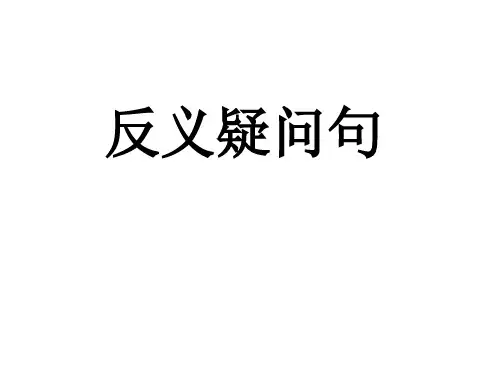
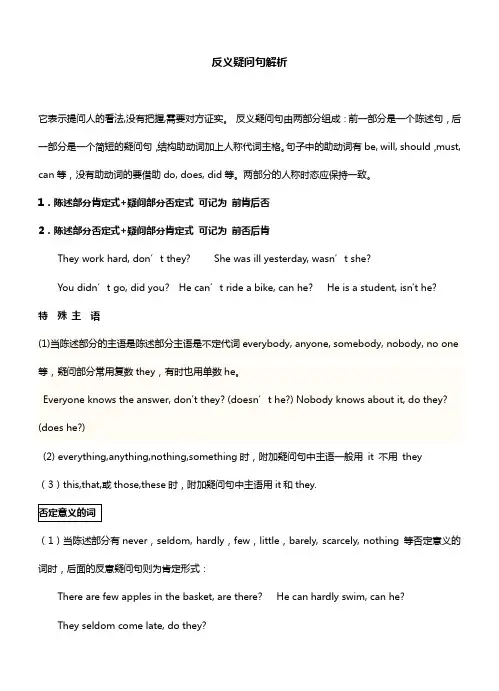
反义疑问句解析它表示提问人的看法,没有把握,需要对方证实。
反义疑问句由两部分组成:前一部分是一个陈述句,后一部分是一个简短的疑问句,结构助动词加上人称代词主格。
句子中的助动词有be, will, should,must, can等,没有助动词的要借助do, does, did等。
两部分的人称时态应保持一致。
1.陈述部分肯定式+疑问部分否定式可记为前肯后否2.陈述部分否定式+疑问部分肯定式可记为前否后肯They work hard, don’t they? She was ill yesterday, wasn’t she?You didn’t go, did you?He can’t ride a bike, can he? He is a student, isn't he?特殊主语(1)当陈述部分的主语是陈述部分主语是不定代词everybody, anyone, somebody, nobody, no one 等,疑问部分常用复数they,有时也用单数he。
Everyone knows the answer, don't they? (does n’t he?) Nobody knows about it, do they? (does he?)(2) everything,anything,nothing,something时,附加疑问句中主语一般用it 不用they(3)this,that,或those,these时,附加疑问句中主语用it和they.(1)当陈述部分有never,seldom, hardly,few,little,barely, scarcely, nothing 等否定意义的词时,后面的反意疑问句则为肯定形式:There are few apples in the basket, are there? He can hardly swim, can he?They seldom come late, do they?(2)当陈述部分含有否定意思的词是unhappy,dislike,unfriendly,impossible等含有否定词缀的派生词,也就是有un-前缀、im-前缀、dis-前缀、-less后缀等含有词缀而意思否定的词,当做肯定句处理,疑问部分要用否定形式。
专四语言知识之反意疑问句一、知识要点反意疑问句也叫附加疑问句( Tag Question ), 主要由“陈述部分+附加疑问部分”构成。
(一) 疑问部分得主语附加疑问部分得主语通常与陈述部分得主语一致, 但需注意下列情况:1、陈述部分得主语就是everything, something, nothing 等指物得合成词时,附加疑问部分得主语用it; 当陈述部分得主语就是everyone, everybody, somebody, someone, nobody, no one 等指人得合成词时,由于这些词未指明性别,因而附加疑问句部分得主语也应用未指明姓名得they。
Everything is arranged in a good order, isn’t it? 一切都安排得井井有条,就是不就是?Someone has broken the glass, haven’t they? 有人打碎了杯子,就是吗?No one knows the history of this museum, do they? 没有人知道这座博物馆得历史,就是吗?2、当陈述部分就是there be 句式,附加疑问部分得主语也用there。
There’s something wrong, isn’t they? 出错了,就是吗?3、当陈述部分得主语就是不定式,动名词,从句或this/that 时,疑问部分得主语通常用it。
Seeing is believing, isn’t it? 眼见为实,不就是吗?This is not as beautiful as that, is it?4、当陈述部分得主语就是不定代词one时, 疑问部分得主语可以用one (正式场合),也可以用you (非正式场合)。
One can not survive without water, can you /one? 人没有水就无法生存,就是不就是?5、当陈述部分就是主从复合句,附加疑问句部分一般应与主句得主语与谓语一致;但就是,当陈述部分得主句就是第一人称主语+think, believe, suppose, suspect, expect等结构时,附加疑问部分往往与宾语从句中得主语与谓语动词保持对应关系, 但要注意否定得转移。
Unit4语法专讲:反意疑问句一、定义:即附加疑问句。
表示提问人的看法,没有把握,需要对方证实。
二、结构:陈述句+ 附加疑问句?It’s hot today ,isn’t it ?三、原则: 1.前肯后否,前否后肯2.前名后代3.时态一致They work hard, don’t they?四、做题方法(一)找动词(1)如果句中有助动词、情态动词、be动词,反意疑问句中也相应的用助动词、情态动词、be动词。
He is a student ,_____________?Tom can ride the bike, ____________?They will go to the park tomorrow,____________?They have been to the Beijing,____________?(2) 如果句中没有助动词、情态动词、be动词,只有实义动词时,就要借助助动词。
She often get up at 6:30 every morning,___________?Mary went to the movies last night,_______________?(二) 判断句子是肯定还是否定,“前肯后否,前否后肯”The students have planted many trees,_________?Her brother doesn’t play basketball every day,__________?【注】:当陈述部分有:no, nothing, nobody, never, few, seldom, hardly, little等否定含义的词时,疑问部分用肯定。
There are few apples in the basket, __________?He can hardly swim, _________?They seldom come late, ________?There is nothing in the bottle,__________?(三) 反意疑问句的主语必须转换成人称代词主格。
条件状语从句引导条件状语从句最常用的连词是if, 由if引导的条件状语从句表示在某种条件下某事很可能发生。
如:If you ask him, he will help you. 如果你请他帮忙, 他会帮你的。
其他的连词:1.unless conj. 除非, 若不, 除非在…的时候You will fail to arrive there in time unless you start earlier.如果你不早点动身, 你就不能及时赶到那儿。
2. on condition (that)... 在……条件下I can tell you the truth on condition that you promise to keep a secret.我可以告诉你真相, 条件是你答应保守秘密。
3. supposing conj. 如果, 假如Supposing it rains, shall we continue the sports meeting?倘若下雨, 我们的运动会还要继续举行吗?4. provided conj.假如,除非,以……为条件He will sign the contract provided we offer more favorable terms.如果我们提出更优惠的条件, 他就会在合同上签字。
另外还有in case, as/so long asIn case it rains, we won’t go there. 如若下雨, 我们就不去了。
As long as you promise to come, I’ll wait for you until you come. 只要你答应, 我就等你来。
在条件状语从句中, 主句用一般将来时, 从句用一般现在时,即“主将从现”练习一.在正确的答案下划一条线。
1.Daina ( will go/go/goes) to Europe if she (will pass/pass/passes) the exams .2. The graduates (will teach/teach/teaches) in the poor village if the Ministry of Education (will agree/ agree/agrees) soon.3. If there (will be/ are/is) a car accident, they (will call/call/calls) 110 for help at once.4. If it (won’t/don’t/doesn’t/ isn’t) rainy, we (will take/ take/takes) walk outside.5. If a UFO (will land/land/lands) in front of me, I (will go/go/goes) in to look for the alien.二、用所给词的适当形式填空1.If you ________(feel) tired, you _______________ (have) to have a rest.2. Where _______ he _________(see) the film if he ________________(have) time?3. If there __________(be) fewer trees, there _______________( be) more pollution.4. He _____________(dress) more casually if he ________________( not work) on weekends.5. If Marcia _____________(live) alone, she ___________________( keep) a pet parrot.三、翻译句子15.如果他到的晚了会发生什么事情?What _______________ if he _____________ late?16. 如果努力学习,你就会取得好成绩。